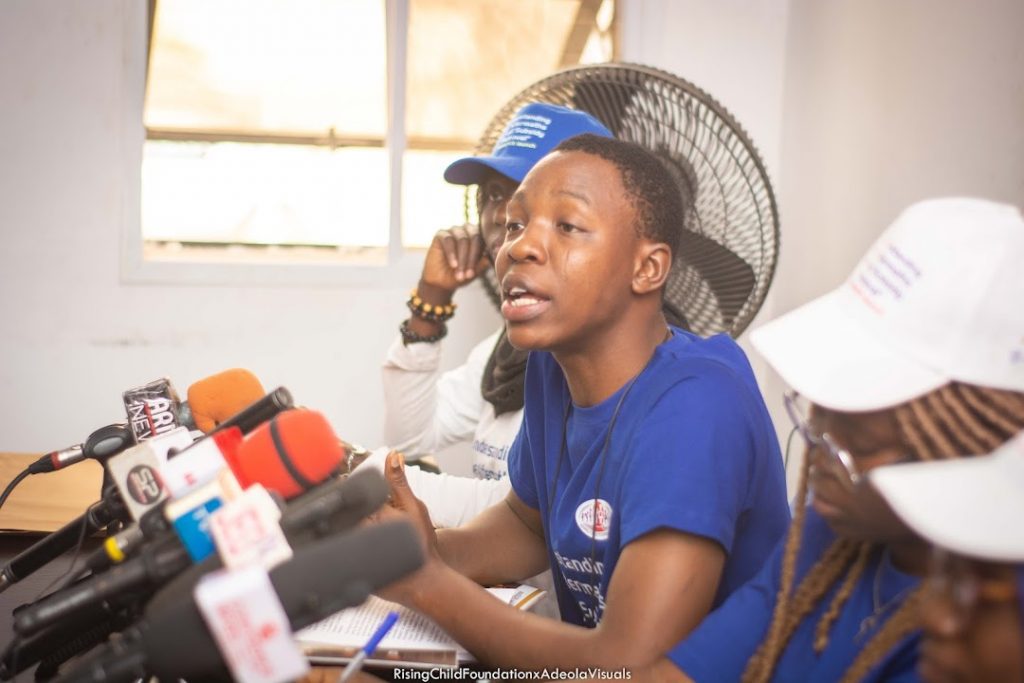By Dare Akogun
The Rising Child Foundation (RCF), a non-profit organization, has called on the Federal Government to conduct a comprehensive review of existing palliative measures to cushion the effect of the fuel subsidy removal.
Taibat Hussain, the Executive Director of RCF, gave this advice at the unveiling of the organization’s research report on the impact of fuel subsidy removal in Nigeria.
She disclosed that the research, which was conducted in partnership with the Brain Builders Youth Development Initiative (BBYDI), sought to “assess the impact of fuel subsidy removal and, more importantly, to develop data-driven practical interventions to mitigate its impact on Nigerians.”
The research, according to her, was funded by LEAP Africa and the Nigeria Youths Future Fund (NYFF).
Represented by the organisation’s Research Intern, Ruth Adeosun, she said while President Tinubu’s decision to stop fuel subsidy payment was essential for long-term fiscal stability and sustainable economic growth, it has triggered hardship and pains for Nigerians, particularly the vulnerable segment of the society.
She noted that her organisation’s research findings showed that majority of Nigerians being low-income earners, are finding it difficult to cope with the negative effects of the subsidy removal, ranging from rising cost of living, increased transportation costs and surge in the prices of essential commodities, stressing that the situation could lead to increased poverty levels in the country, if not properly addressed.

To mitigate the impacts of the subsidy removal on the masses, the RCF recommended supplementary interventions to mitigate the effects of subsidy removal and urged the government to consider these measures in the interest of the Nigerian populace.
It equally advised the government to invest in alternative energy sources to reduce Nigerians’ dependence on generators that require fuel to power.

She said: “it is crucial for the government to explore innovative and cost-effective transportation solutions that can alleviate the burden on the population. This should include initiatives such as funding for ride-sharing programs and transport vouchers.
“Furthermore, the government should consider providing specific incentives or subsidies for public transport operators to maintain fare stability and minimize the impact on daily commuters, as well as promoting alternative modes of transportation that do not rely on fuel and increasing targeted investments in transportation infrastructure.
“The loss of jobs due to the increase in operating costs for businesses is another major effect of the fuel subsidy removal. Our findings show that the adverse effects of the discontinuation of fuel subsidies are being worsened by Nigeria’s increasing unemployment rate. The government has to create jobs and develop an economic ecosystem where talents and skills are met with the right opportunities.
“While palliatives and other measures will mitigate the effects being felt by Nigerians, a lack of well-paying jobs will frustrate progress to be made by the palliative initiatives, as many citizens without jobs will have to rely solely on the government and thereby become liabilities. This highlights the urgent need for the government to prioritize job creation and invest in industries that can provide stable employment opportunities.
“Based on the research findings, the removal of fuel subsidy has had a considerable impact on businesses, particularly small-scale enterprises The government is therefore advised to provide funding support to support small-scale businesses, offering low-interest loans, subsidies, or tax breaks to help them adapt to the new economic environment.
“Moreover, it is critical to implement policies that promote business sustainability, such as customized subsidies for industries adversely affected by the removal of subsidies.”
The organisation also urged the government to ensure that its policies are data-driven, engage citizens in decision-making process to promote transparency and inclusion, and develop and implement policies to address peculiar challenges faced by vulnerable groups, especially individuals with disabilities.
“During our research, a major concern identified by citizens was the lack of engagement and consultation by the government before it announced fuel subsidy removal. We, therefore, encourage government at all levels to always engage the citizens in decision-making process to promote transparency and inclusion.
“This can be achieved through various platforms such as town hall meetings, forums, and interactive discussions. Actively seeking public input and participation establishes a foundation of trust, enriches the policymaking process with valuable insights, and contributes to informed and inclusive governance.
“It is crucial for the government to proactively develop and implement tailored policies that address the unique issues confronted by vulnerable groups, particularly individuals with disabilities. Such policies should encompass measures to enhance accessibility and provide continuous assistance, recognizing the specific and diverse challenges faced by these groups on a daily basis.
“We are of the belief that all these recommendations support a comprehensive, compassionate, and collaborative approach to addressing the multifaceted challenges arising from Nigeria’s fuel subsidy removal,” she said.
The Rising Child Foundation particularly stressed the importance of transparency in the disbursement of palliatives and emphasized that a thorough review of existing measures is essential for addressing any inefficiencies in the system.

